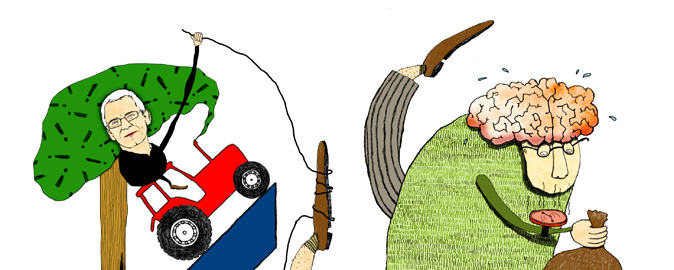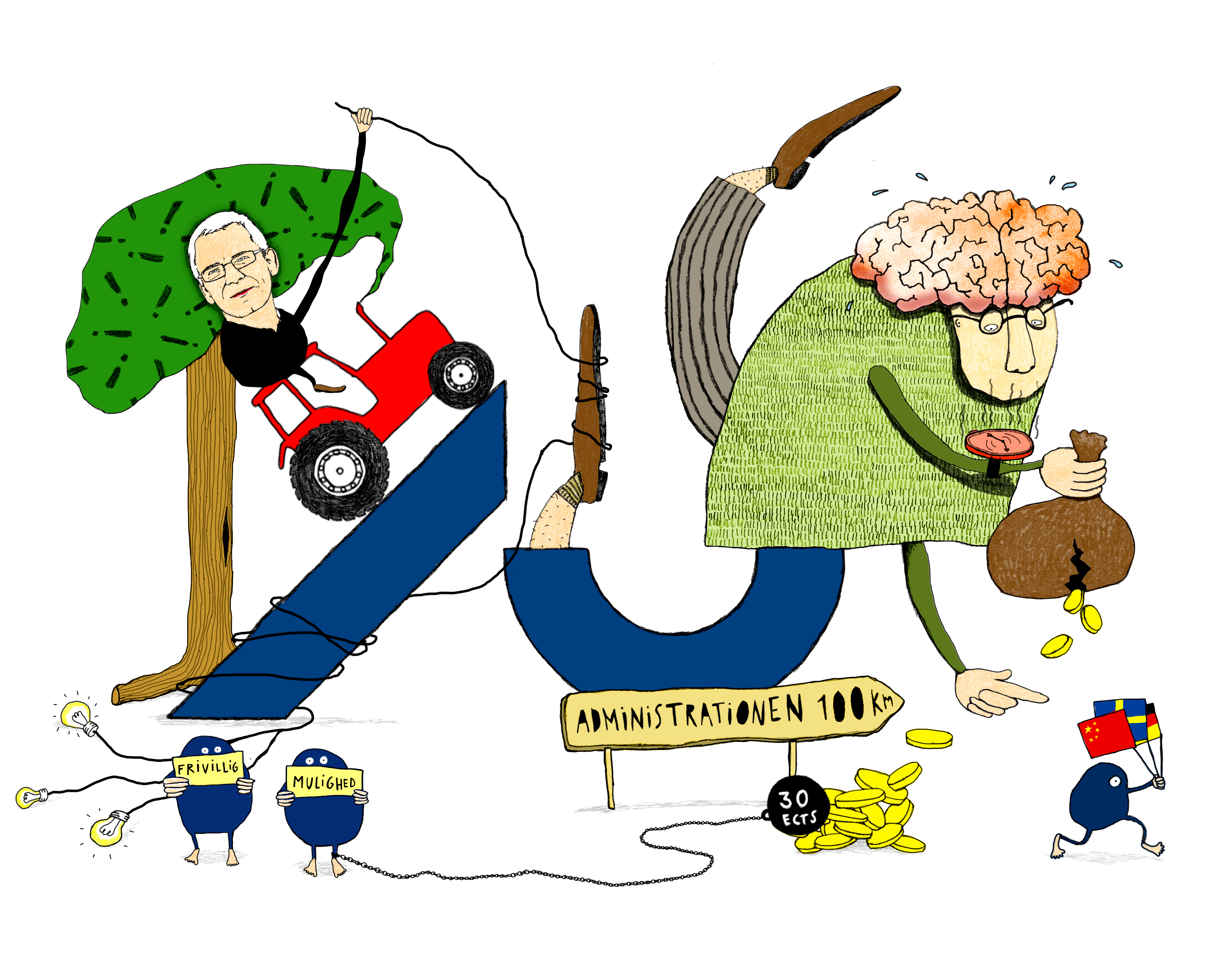Review of the AU year
Omnibus asked students and staff to point out the highs and the lows at AU in 2013.


 | Birgit Sørensen Langvad, head of secretariat at the Department of Agroecology The highs at AU in 2013 “Agricultural research at AU is now ranked 16th in the world according to the international NTU Ranking list. That’s just wonderful! The Department of Agroecology plays a major role in AU’s agricultural research, and we’re proud that our ranking has continued to rise – after we became part of AU, as well. This confirms that we’re on the right track. It’s teamwork that counts. From my own personal perspective, I’m really pleased that the heads of our AU secretariats have enjoyed such good teamwork over the past year – thanks to a joint competence development process, among other things. We now have a good network for sharing our experiences not only internally at the faculty, but also ACROSS the faculties.” The lows at AU in 2013 “In the description of the academic development process in the report on 9 March, it was proposed ‘(...) that the administrative services should be determined based on a holistic consideration of the needs of users’. Like other people at AU, I assume that the users being referred to here are departments, researchers, technicians and other similar groups. But things have gone badly wrong. I think what has actually happened is that a state within a state has been created. Lots of our excellent former colleagues were transferred to the joint administration because that’s where their tasks were to be done in future. But what’s happening now is that a lot of these tasks are slowly returning to the researchers and secretariats at the departments – without the staff being returned as well. Surely we could do better than that.” | |
 | Taus Tornhøj Sørensen, The highs at AU in 2013 “The work that the student representatives on the board, Heidi Klokker and Benjamin Bilde Boelsmand, have done in relation to talent development. The board had proposed that talent programmes should be implemented in all the main academic areas for the chosen few at the expense of the general teaching. We feared that this would divide the students into an A team and a B team. But Heidi and Benjamin have worked to ensure that the talent programmes are a voluntary option for students who feel they can cope and would like to take on an extra challenge.” The lows at AU in 2013 “The obvious choice would be the study progress reform, which is on everyone’s lips at the moment. But it’s hard to say because AU haven’t yet announced how it’s going to be implemented. What worries me personally is whether it will still be possible to go on placement or exchange. Another low is that the administration is located so far away from the students on a daily basis. And I think the results of the psychological workplace assessment were disastrous. It makes a big impression to see that our teachers are so stressed.” | |
| ||
 | Steen Nepper Larsen, The highs at AU in 2013 “The pleasure of hearing a colleague presenting a bold and visionary thesis at a research programme meeting; giving lectures on educational policy and language criticism to thousands of Denmark’s pedagogical professionals; the eyes of enthusiastic and inquisitive students on stalks in the corner lecture theatre in building 2113 on Trøjborg and in the ceremonial hall (A 220) in Emdrup while I talk about embodied cognition one day and the concept of education the next; the refreshing contrast between the first supervision meeting with two uncertain, shaky students and the excellent assignment that was the result ... the highs at AU in 2013 form a long and impressive list.” The lows at AU in 2013 “Warnings of cuts and dismissals at AU in the wake of hopeless mergers and costly increases in the number of managers; new public management and the university’s sickening and disgraceful transformation into a short-term production company run on market terms; pseudo-democratic hearings and discussions about topics which turn out to be peripheral; a radical contrast between the Teflon words of the management and daily life at the academic grassroots; terrible workplace assessments which have no consequences; vaguely defined powers of authority; hopeless and essentially unambitious and servile managers at lower, local levels in a huge university machine ... the lows at AU in 2013 form a long and depressing list.” | |
| ||
 | Susanne Bødker The highs at AU in 2013 "From my perspective on the university board, I would have to say that the most important thing that happened in 2013 was the appointment of the new rector. We were fortunate to receive a large number of good applicants, and in particular we were delighted that Brian was one of them. I am convinced that he is the right man to navigate through the shake-up process that has now been launched. From day one he has demonstrated his ability to speak plainly so people can understand what he’s talking about, and he has exactly the kind of calm approach for which the Jutlanders are so justly renowned!" The lows at AU in 2013 "If you had asked me one week ago, I’d have said that the worst thing is that the university has been punished so hard because the number of exchange students coming to Aarhus exceeds the number of Danes we send abroad. We ought to be proud of the fact that so many young people choose to come to Aarhus to study, but the ministry clearly does not interpret the concept of internationalisation as simply as that! However, unfortunately this has all been overshadowed by the recent news of our financial situation." | |
| ||
 | Gorm Harste, Årets højdepunkt for AU i 2013 "The best thing that’s happened at Aarhus University is that we now have a new rector who doesn’t communicate in clever-sounding clichés, employing what’s known in organisation research as “hypocritical communication”. The new rector has even promised to cut the administrative budget of DKK 450 million by a total of DKK 100 million. Of course it would have been even better to cut an additional DKK 50 million, which could have been spent on free, innovative research centres. The best news for researchers and teachers at the university is that they can expect a reduction in the number of long, superfluous newsletters, studies, reforms, and new IT systems to replace the ones they have only just managed to get used to." Årets lavpunkt for AU i 2013 "The worst thing that’s happened at the university during the past year comes from the Danish Ministry of Science, Innovation and Higher Education. Study progress reform my foot! The new reform simply makes me want to throw up. What they seem to be looking for is more one-track students. I refuse to believe that the stupid idea of forcing students to take 30 ECTS credits each semester came from the minister, Morten Østergaard. He was once a very sensible member of the board of studies at my old department. Here’s why it’s hypocritical: it’s OK to want students to study full-time; but the paradox is that they can’t be full-time if they’re forced to do a job, or if they study abroad for semesters that don’t correspond to our own. Students are not allowed to take more than 30 ECTS credits each semester, so they can’t save any credits up and we can’t create top-class students who are capable of taking two programmes at the same time. At the same time, the option of using student teachers will also be discontinued – a practice which has plenty of educational advantages." | |
| ||
 | Anders Correll, The highs and the lows at AU in 2013 "I think these are two difficult questions. Because in general 2013 has been a year of major challenges, changes and significant news. Boom and bust often go hand in hand, of course; and in 2013 they look like a sine curve rising and falling across the entire year. We started the New Year at the bottom of the curve when the results of the workplace assessment were published. Some serious work was clearly needed to improve the psychological working environment. And this is what is happening. Major efforts are being made to help the unacceptably large number of employees who are affected by stress. So the curve is on its way up again in this respect. Then we had a new rector, which was an obvious opportunity to give the wide-ranging AU reform a thorough inspection. Reports of an upcoming inspection created an atmosphere of calm and optimism, as well as a belief that the light at the end of the tunnel was NOT a train heading straight towards us. This is what I regard as the high point of 2013. But as the saying goes, happiness is short lived – much too short lived. We have just announced major cuts, resulting in uncertainty. We will have to part company with a number of good colleagues. So now we’re back at the bottom of the curve. Have I forgotten the students? Here are a few of the things I could have mentioned: The government is proposing that funding will be granted for Danish students studying abroad, but not for exchange students studying in Denmark. There has been a reform of the grant system, and the government is also introducing what is known as the study progress reform. But I will leave all that to the Student Council and other active students. In 2013 they have indicated their dissatisfaction on several occasions, and in no uncertain terms. Even in the corridor outside the rector’s office. Whether you agree with the students or not, it’s great to see them playing such an active part in the debate."
|
Photos: Anders Trærup, Janne Hansen, Jonas Raaby og Lars Kruse
Translated by Nicholas Wrigley

